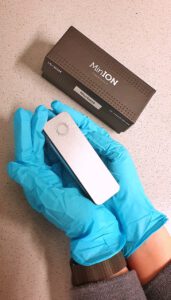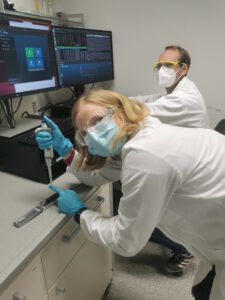My name is Sophie Simon, I am a scientist at the University of Duisburg-Essen in the research group for aquatic microbial ecology and I am doing my PhD within the MultiKulti project. Already my master thesis was integrated in the project MultiKulti and during this time I got fascinated by “Nanopore Sequencing” using MinION. For every new experiment, it´s amazing how quickly and easily this small, mobile device is sequencing nucleic acids in real time and almost unlimited read lengths. Therefore, I´m really happy to be able to contribute to the success of the project with “Nanopore Sequencing” in my PhD-thesis:
At the University of Essen, we are particularly interested in archaea of the genus Altiarchaeota, highly abundant microorganisms in deep groundwater. Cold water geysers, as the geyser in Andernach, which are driven by CO2, provide an excellent access to deep groundwater and the microorganisms within. Preliminary work based on metagenomics has shown that the deep groundwater of the geyser in Andernach contains almost exclusively Altiarchaeota. Although the ecophysiology of Altiarchaeota might be better understood than for other uncultured archaea, they could not be cultivated in the laboratory yet. During a collaborative sampling campaign in November 2021, we filtered water of the geyser to collect cell material for DNA extraction. Subsequently, we were able to perform genome-resolving metagenomics using “Nanopore Sequencing” and thus obtained (after more than 10 years of research) the first closed genome of an Altiarchaeum. This is a very important step towards successful cultivation for us, as we can use the closed genome to investigate the genetic and biochemical potential and thus optimize the conditions for a targeted cultivation approach.
I am looking forward to deepen my knowledge in microbial cultivation and learn more laboratory techniques and bioinformatics methods during my PhD in the MultiKulti project.


